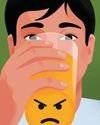
IT STARTED AROUND five years ago. My boys were two and four, my wife was a stranger, and my professional life felt like an avalanche of uncertainty and stress. In the morning, the air smelled like cinders; in the evening, the sun looked like blood. When people opened their mouths, I stared at them blankly. All I could hear was the howling of orcs.
More than half of guys who have symptoms of depression – and may benefit from antidepressants – don’t seek professional help. I’m not one of those guys. My primary-care doc handed out the candy: 150mg of bupropion, a starter dose. I whined, and she doubled it.
Life got less jagged. I discovered a newfound emotional resilience. Marital spats no longer led to isolation. A wind chime replaced the tolling of doom.
These days, life feels almost Brady Bunch normal. Every morning, I wake up humming like an idiot. Feed the kids, water the plants, pop the pill. Heck, I could do this forever. Many people do. According to the PBS, one in every eight Australians are using the drugs, including about 100,000 children.
A STAB IN THE DARKNESS
Thing is, there’s a lot we don’t know about antidepressants and how and why they interact with the brain, largely because we don’t understand most of the hows and whys of the brain itself. What we do know is that there is recent research that suggests that some antidepressants – including the class known as SSRIs (selective serotonin reuptake inhibitors) – may increase the risk of heart attacks, seizures and dementia, among other things. Granted, the data remain pretty squishy – more correlation than causation. And no one has conducted long-term research on antidepressants for anywhere close to the amount of time people have been on them – in some cases, 25 years.
Diese Geschichte stammt aus der March 2020-Ausgabe von Men's Health Australia.
Starten Sie Ihre 7-tägige kostenlose Testversion von Magzter GOLD, um auf Tausende kuratierte Premium-Storys sowie über 8.000 Zeitschriften und Zeitungen zuzugreifen.
Bereits Abonnent ? Anmelden
Diese Geschichte stammt aus der March 2020-Ausgabe von Men's Health Australia.
Starten Sie Ihre 7-tägige kostenlose Testversion von Magzter GOLD, um auf Tausende kuratierte Premium-Storys sowie über 8.000 Zeitschriften und Zeitungen zuzugreifen.
Bereits Abonnent? Anmelden

Good Guy, Bad Drinker
When booze is involved, you might not be as charming as you think you are

How To Change Your Story
For a third of my life, I lived in an endless replay of the story of how I never measured up – a loop that kept me locked in a spiral of shame and meaningless hustling. Then I got the nudge to do some fact-checking

THE GOOD FIGHT
When the going gets tough . . . the tough put others first. Here we salute some of the more selfless and courageous responses to the COVID-19 pandemic. Why? Because hope and optimism are catchy. And in this time of crisis it’s worth remembering that the virus isn’t the only thing that spreads

TAKE REMOTE CONTROL
Working from home using furniture that isn’t built-for-purpose could take a toll on your body. MH editor Scott Henderson went hunting for solutions

Morgan Mitchell
The eye-catching star of the track has stopped running from a troubled past and is doing things her way. Get used to it

SNACK SIZED - WORKOUTS
Purpose-built for the busy man, micro workouts could make you stronger, fitter and more mobile. The best part? You can do them in self-isolation and integrate them into your working day

ENTER THE BEAST
Big, fast and ultra high-performing, Mercedes’ latest offering could make a grown man cry

KUMAIL NANJIANI CAN DO ANYTHING
TRANSFORM HIS WHOLE BODY. REIMAGINE A MARVEL HERO. REDEFINE THE ROLE OF LEADING MAN. AND (OF COURSE) MAKE US LAUGH

HOW 25 YEARS OF THE GEORGE FOREMAN GRILL CHANGED HOW MEN COOK
What happens when an ageing prizefighter, a quirky gadget and iconic ’90s marketing combine to take over the world?

BETTER MAN
Pop superstar Robbie Williams got in fighting shape while beating his mental demons into submission. Here he reveals how he pulled off perhaps the biggest transformation of them all